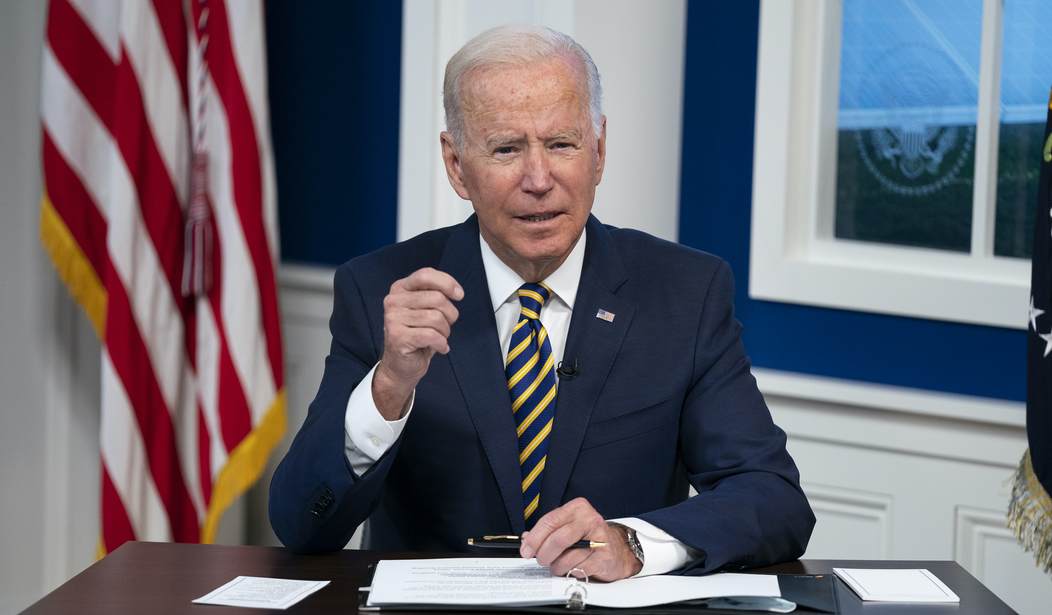There are still 17 days until Pelosi’s deadline for passing the two bills through the House plus a 24-hour grace period before Virginia goes to the polls in its increasingly important gubernatorial election. That would be plenty of time to get this done if Democrats were on the same page.
But they aren’t. As Ed noted yesterday, even Joe Manchin and Kyrsten Sinema aren’t on the same page with respect to important provisions like whether Medicare should be empowered to negotiate drug prices. (Sinema’s a no, Manchin’s more willing.) That means even if Biden, Schumer, Pelosi, and the House progressives wanted to cave to Manchinema in the name of passing something ASAP, they couldn’t. There’s no “Manchinema” proposal that would lead the way out of this mess. For the moment, Democrats have 49 votes at best in the Senate for anything that’s on the table.
Seventeen days to go. Tick tock.
Seemingly out of options on how to bring the various parties into alignment, the White House is now resorting to pointing at the calendar and hollering, “C’MON.” Jake Sherman of Punchbowl posted this statement today from a “source close to the White House”:

Bloomberg’s sources are saying the same thing:
An administration source confirms that this "time's almost up" statement is an accurate description of their sentiments on reconciliation negotiations https://t.co/OfTbBbddfP
— Jennifer Epstein (@jeneps) October 14, 2021
Pelosi’s artificial deadline can always be delayed, as embarrassing as that would be for Democrats. Election Day in Virginia can’t be. If Dems can’t get it together in time to pass something that Terry McAuliffe can trumpet on the trail and he ends up losing a squeaker to Glenn Youngkin, the recriminations afterward will be ferocious. Democrat Mark Warner, who represents Virginia in the Senate, has begun pressuring Pelosi to break her promise to treat the two infrastructure bills as a package deal in the House in the name of handing McAuliffe a win:
Warner: "Let’s go ahead take a couple of these wins…we’re 19 days away from an election in Virginia. The president’s got a huge win sitting out there."
— Igor Bobic (@igorbobic) October 14, 2021
She’s kept her pledge to progressives thus far, refusing to bring the bipartisan bill to a vote until there’s a deal on reconciliation. But as we inch closer to Election Day, the burden on her and Biden — and House progressives — to reverse course and pass the bipartisan bill will be enormous. The left might buckle and agree to pass it under those circumstances if only to avoid being blamed for a McAuliffe defeat had they refused.
But given the difficulty in crafting a bill that would satisfy Manchin and Sinema and progressives in the House and Senate, progs might be throwing away all of their remaining leverage over reconciliation if they pass the bipartisan bill first. All along I’ve thought that Dems would eventually pass both bills, but with public anxiety rising about inflation and the two centrist holdouts in the Senate having trouble getting on the same page, the odds are growing that reconciliation will fall apart entirely. And if it does, there’s a chance furious lefties will walk away from the bipartisan bill out of spite.
Which is why, if I were Pelosi, I’d start nudging the progs in my caucus to put some points on the board by passing the bipartisan bill in the name of helping out McAuliffe. Maybe reconciliation will eventually pass anyway, or maybe it won’t. And if it doesn’t, Dems are at risk of watching Biden’s entire agenda go down the tubes. Better to bank the bipartisan bill while you still can.
You would think a party that’s up against a hard deadline would be in the serious phase of its negotiations, abandoning proposals that stand little chance with the centrist holdouts and honing in on ones that might attract them. This HuffPost piece makes it sound like they’re still screwing around, though:
During a caucus meeting last Thursday with Senate Democrats, leadership pitched a top line of roughly $1.5 trillion in new spending on programs such as child care, housing, climate policies and Medicare expansions, according to presentation slides obtained by HuffPost and top Senate aides familiar with the presentation.
The bill would also provide around $1 trillion in “tax cuts for working families” — including an extension to the boosted child tax credit, Affordable Care Act premium subsidy credits and housing and clean energy tax credits. Overall, the bill’s price tag would be around $2.5 trillion…
But even $2.5 trillion is higher than what Sens. Joe Manchin (D-W.Va.) and Kyrsten Sinema (D-Ariz.), the Senate’s two most conservative Democrats, say they will support.
Manchin and Sinema have been clear that they don’t want to do more than $2 trillion. Essentially, Schumer’s asking them to cave on that and to disguise their capitulation with a cheap budget gimmick in which lost tax revenue supposedly doesn’t count towards a bill’s “cost.” Think they’ll go for it?
Me neither.
Here’s James Carville insisting that Dems have a salesmanship problem on the reconciliation bill. I don’t know — seems to me they have a “can’t get enough people in Congress to agree” problem. By the way, even if they hammer out a deal on infrastructure, the next debt-ceiling standoff is right around the corner in December. And Dems are negotiating against themselves on *that* too. Some centrists want Schumer to knock it off already and just raise the ceiling via reconciliation to avoid any chance of default but others like Tester are adamantly opposed. The many “Dems in disarray” news cycles are getting hard to keep track of.
'We don't have enough hustlers in Washington': Strategist James Carville believes Democrats need to show 'moxie' to sell their message to Republicans pic.twitter.com/poeIG0P3QT
— MSNBC (@MSNBC) October 14, 2021








Join the conversation as a VIP Member